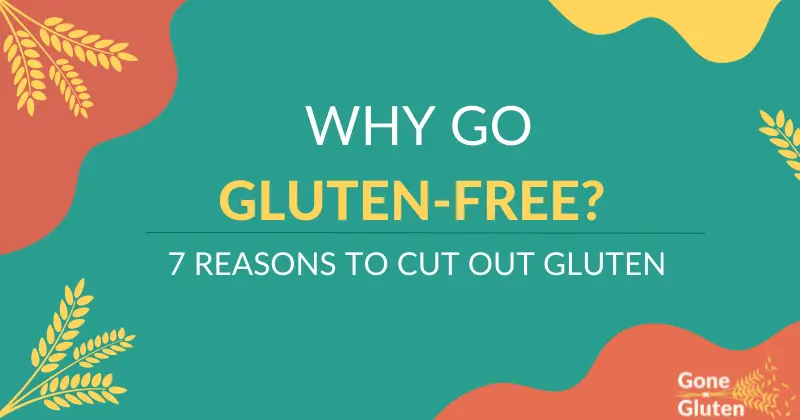Today more than ever, we’re seeing gluten-free labels almost everywhere. This may cause you to ask the question, why go gluten-free?
Gluten (a protein found in wheat, barley, and rye) could be having more of an effect on your body than you’re aware of. I have been on a gluten-free diet for two years now and have never felt better.
Have you been debating going gluten-free? Let’s take a deeper look and find out if this diet is suitable for you.

Is Gluten-Free Healthier?
A gluten-free diet has gained popularity throughout the years. Gluten-free products are often thought to be healthier than those without the label. Sorry to burst your bubble, but that is not the case. While gluten-free products are beneficial to those that need them, they are no healthier than the original product.
However, eating an unprocessed food diet is better for everyone. Natural foods such as nuts, meat, fruits, vegetables, and seeds are all gluten-free (as long as you’re not adding anything to them). If you’re eating this daily and cutting out refined products, then yes, it is healthier.
If you remove gluten from your diet without replacing it with other nutrients, you could be missing out on the proper amount of fiber needed for your digestive system.
So, if gluten-free products are no healthier than those containing the protein, why cut it out of your diet in the first place? Here’s the shortlist:
- Celiac Disease
- Wheat Allergy
- Gluten Intolerance
- Gluten Ataxia
- Dermatitis Herpetiformis
- A Gluten-Free Diet Can Reduce Inflammation
- A Gluten-Free Diet Could Ease Anxiety And Depression
Let’s get more in-depth.
1. Celiac Disease

The most common reason people adhere to a gluten-free diet is that they have been diagnosed with celiac disease. This is an autoimmune disease in which gluten in the bloodstream damages the lining in the small intestine, making it difficult for the body to absorb the proper nutrients from food.
It affects about 1 in 100 people worldwide.
This can cause numerous symptoms such as:
- Diarrhea
- Fatigue
- Weight loss
- Inflammation
- Bloating and gas
- Abdominal pain
- Nausea and vomiting
- Constipation
If left untreated, the disease could cause severe damage to the body and lead to Infertility, nerve damage, arthritis, seizures, and more. The only way to manage celiac disease is to follow a strict gluten-free diet.
Celiac disease can be diagnosed with a simple blood test; however, you must be currently consuming gluten for the blood testing to be accurate.
2. Wheat Allergy

A wheat allergy and celiac disease are not the same things. A tad confusing, I know, but don’t worry, I’ll explain the differences.
A wheat allergy is a reaction to proteins in wheat that cause typical allergic reactions such as swelling, itching or irritation of the mouth or throat, hives, itchy rash, or swelling of the skin, and nasal congestion. It does not attack your small intestine as gluten does to those with celiacs.
This allergy can be diagnosed in two ways, a skin prick test or a blood test. Managing the allergy includes strict avoidance of wheat. A gluten-free diet will help you avoid wheat and other gluten-obtaining grains that could encounter cross-contamination.
3. gluten Intolerance

This is another common reason to cut out gluten and the winner for me. I have not been diagnosed with celiac disease, but I have experienced many related symptoms.
These include:
- Joint pain
- Stomach pain
- Fatigue
- Headaches and migraines
- Rashes
- Irregular bowel movements
- Brain fog
While an individual with gluten intolerance will experience similar symptoms, there is no intestinal damage. While this cannot be diagnosed, you should receive a blood test while gluten is still in your diet to rule out celiac disease or a wheat allergy. The only way to relieve these symptoms is to follow a gluten-free diet.
4. Gluten Ataxia

Gluten Ataxia is often left in the dark and not as regularly talked about as celiac disease, a wheat allergy, or gluten intolerance. Like celiac, gluten ataxia is an autoimmune disease; the main difference between the two is the effect they have on the body.
In an individual with gluten ataxia, gluten antibodies are released while digesting gluten that attacks the cerebellum part of the brain.
Symptoms include:
- Loss in balance
- Blurred vision and trouble moving your eyes
- Tingling in extremities
- Poor coordination
The symptoms slowly progress over time and can become permanent if not dealt with properly. Gluten ataxia is not fully recognized and is unlikely to receive this specific diagnosis. To treat gluten ataxia, you must completely remove gluten from your diet.
5. Dermatitis Herpetiformis

While gluten is commonly linked to affecting you internally, it can also have an extreme effect on the skin.
Dermatitis Herpetiformis (DH) is chronic blistering of the skin. It is often found on the elbows, knees, buttocks, back, or scalp but can also be located on your face or groin.
This rash will occur symmetrical, meaning wherever the rash occurs on the right side of your body, it will appear in a similar placement on the left side of the body. To obtain a proper diagnosis, you must receive a skin biopsy.
The only way for you to reduce the appearance of DH is to stick to a completely gluten-free diet.
6. A Gluten-Free Diet Can Reduce Inflammation

Inflammation is part of your body’s natural healing process and defense against viruses. While this can serve a purpose, consistent inflammation in the body can be extremely uncomfortable and cause numerous health implications.
Gluten-containing foods are pro-inflammatory and can cause inflammation in the gut and joints. Eliminating gluten from your diet can reduce inflammation in the body as well as arthritis flare-ups.
7. A Gluten-Free Diet Could Ease Anxiety And Depression

Yup, you read that right. A gluten-free diet could help you with your anxiety and depression. Until I did the research myself, I had no idea how much my diet affected my mood and mental state. If you’re unaware of how the two are connected, I will get you caught up to speed.
90% of your serotonin (the hormone that regulates your mood) is produced in your gut. Meaning if your gut is not functioning correctly, this hormone cannot receive the proper nutrients it needs for production and could cause a hormone imbalance.
The removal of gluten from your diet has been proven an effective form of treatment for mood disorders.
The Purpose Of A Gluten-Free Diet
While the gluten-free diet has turned into a health fad, the main purpose is to relieve symptoms of the several health issues stated above and to prevent further complications. Other individuals that do not have gluten sensitivity or medical issues have been using the gluten-free diet as a means to live a healthier lifestyle.
Check out this video for a visual explanation of what gluten is and the purpose of a gluten-free diet.
Is Gluten Bad For Weight Loss?
There is no direct evidence that getting rid of gluten can lead to weight loss. However, sticking to naturally gluten-free foods like lean meats, low-fat dairy, vegetables, fruit, whole gluten-free grains, and healthy fats will have positive effects on your body.
If you are simply replacing the gluten in your life with processed gluten-free alternatives, this could actually cause weight gain. These products tend to include more sugar and refined carbohydrates.
The only weight you’ll lose is from your wallet, as these products are significantly more expensive than those that contain gluten.
Details Of a Gluten-Free Diet

If it’s time for you to adhere to a gluten-free diet, get ready to become a master at reading labels. Following this diet means avoiding any foods containing wheat, rye, barley, or triticale (a hybrid of wheat and rye) and paying close attention that it doesn’t sneak its way into foods you thought were safe.
Whenever I’m buying processed foods, I make sure gluten-free is clearly on the label. Foods that are labeled gluten-free under the Food and Drug Administrations standards will have fewer than 20 parts per million gluten.
Some gluten-containing foods are more obvious than others. There will be times you will read the ingredients label and be shocked that it contains gluten; I’ve been there. Gluten is often used to bind foods together so it’s in more products than you might have thought.
Gluten Containing Ingredients To Avoid

Gluten can slip into your food like a sneaky ninja. While it appears in wheat, rye, barley, and triticale, as previously stated, it also shows up in an array of other ways. When reading labels be sure to keep an eye out for any of the below ingredients as they all include gluten.
- Malt
- Malt flavor
- Malt extract
- Malt vinegar
- Dextrin
- Wheat starch
- Brewer’s yeast
- Durum
- Einkorn
- Emmer
- Kamut
- Spelt
Foods You Can Eat On A Gluten-Free Diet

While eating a gluten-free diet can require some work, don’t worry; there are plenty of naturally gluten-free options. Here is a list of foods I include in my diet on a regular basis.
- Meats and Fish- Stay away from pre-marinated or anything battered
- Potatoes
- Rice
- Quinoa
- Eggs
- Fruits
- Vegetables
- Naturally gluten-free flours- you don’t have to miss out on flour, there are plenty of alternatives. These include almond flour, potato flour, chickpea flour, and more.
Eating foods that naturally don’t contain gluten, tend to be better for both your body and your wallet.
But hey, I’m human; I get that eating naturally gluten-free isn’t fun all of the time. Sometimes you have a craving that only processed goodies will solve. Some of my favorite gluten-free treats include Reese’s peanut butter cups, Lay’s Kettle Cooked salt and vinegar chips, and gluten-free Oreo.
Remember, if you’re buying processed products, look for a gluten-free label.
Final Thoughts
While the gluten-free diet has gained popularity, it is far from a fad for those with allergies, celiac disease, and other dietary issues. Sustaining from gluten can alleviate various symptoms and eliminate the possibility of serious health issues in particular individuals.
For tips on how to live a gluten-free lifestyle, check out more Gone Gluten articles.



